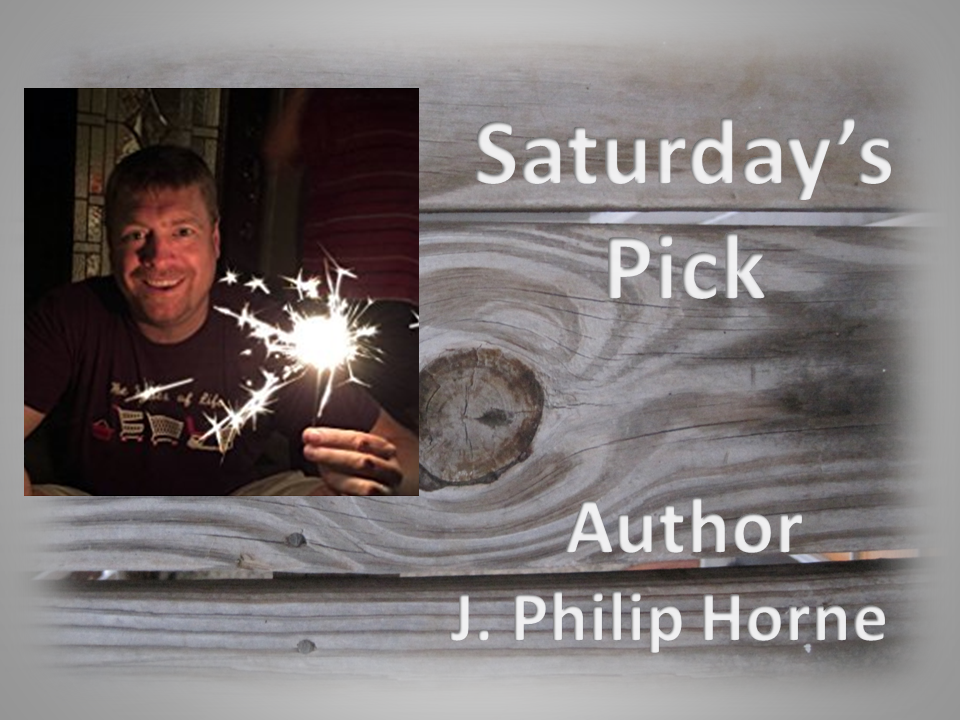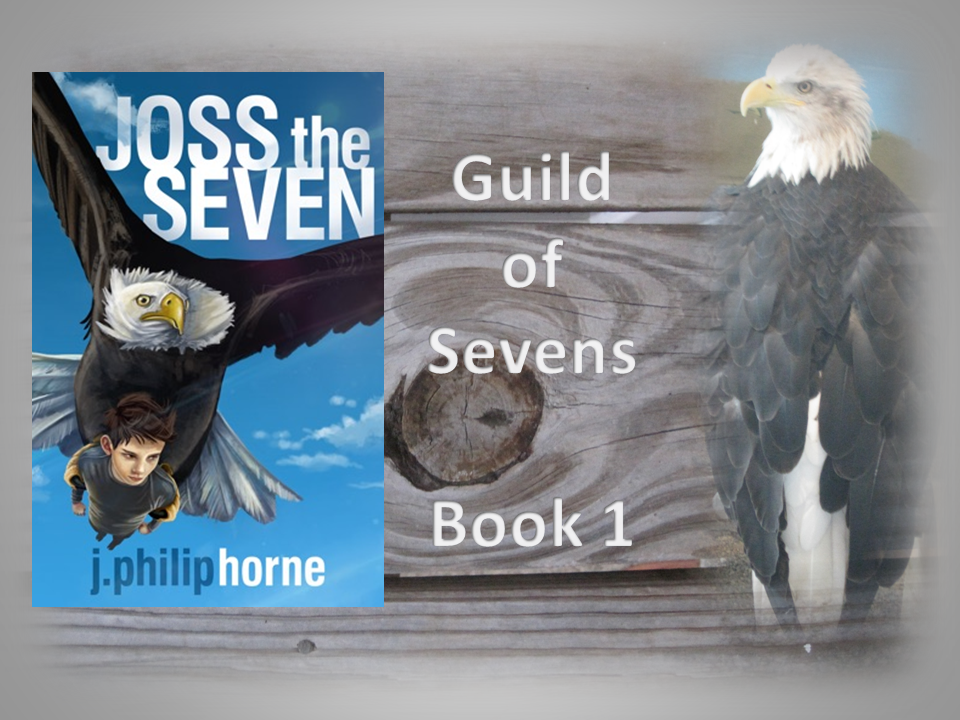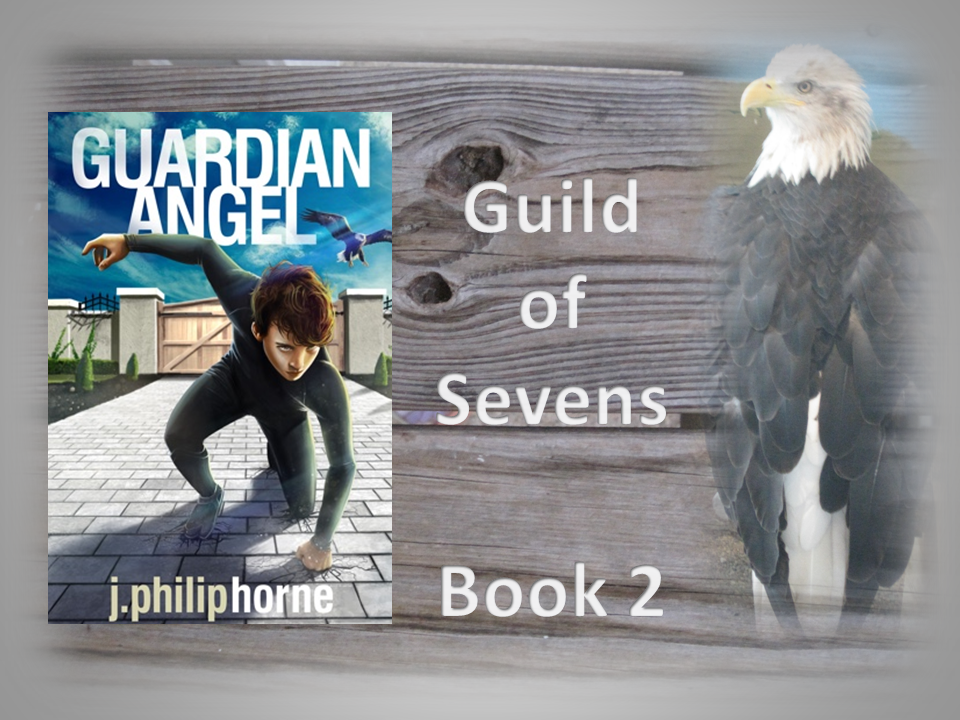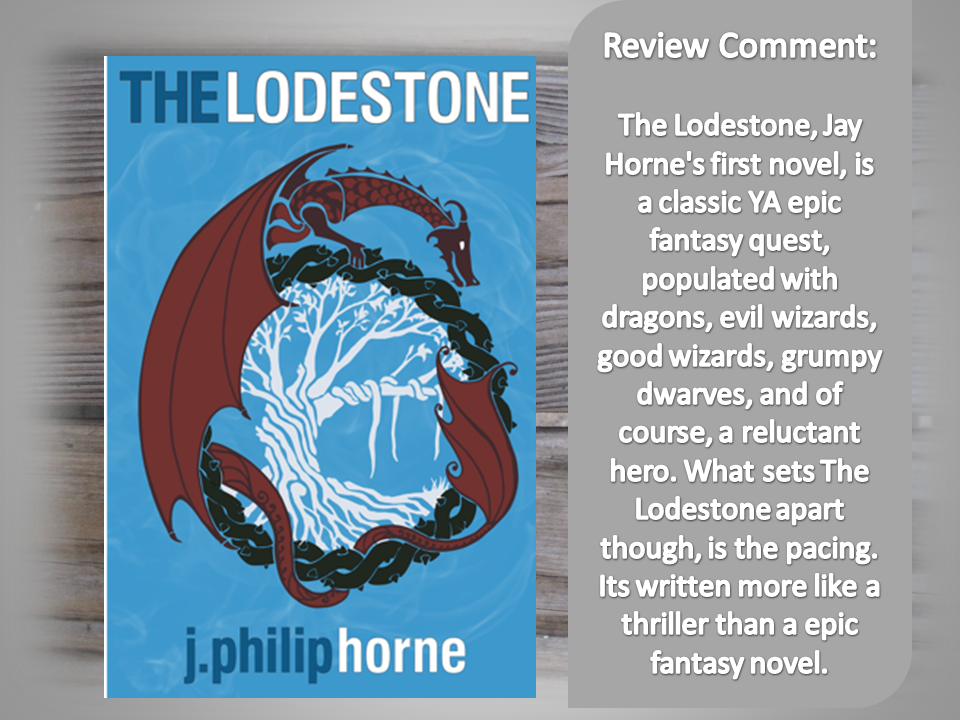One of My Favorite Middle Grade authors: J. Philip Horne
This Saturday’s Pick is Author J. Philip Horne. I closed the last page of Joss the Seven minutes before writing this interview. As the mother of two sons, I know this book will delight every middle-school student who reads it and everyone who loves a fantasy involving shifting and ghosting. But it doesn’t stop there. Joss Morgan is a super-hero in every sense of the word.

J. Philip Horne probably shouldn’t be alive. Born in Florida, he grew up overseas for the most part, spending much of his childhood in Liberia and Micronesia. During those years, he experienced numerous attempts on his life. The wannabe killers included malaria, spinal meningitis, blood poisoning, a staph infection in his heel bone, a close encounter with a green mamba, and other cold-hearted foes.
From his earliest years, his parents read to him fantastical stories from wonderful worlds. Narnia and Middle Earth featured prominently, and had his youth been a generation later, he would have certainly encountered Hogwarts at a young age. Through his teen years, he read stories by many other authors and experienced a host of new worlds.
After dabbling in writing for many years, he finally got serious and wrote his first novel in 2011. He has continued to write ever since. He currently lives in Dallas, Texas with his wife, four children, two dogs, two rabbits, and several literary aspirations.
Joss the Seven (Guild of Sevens Book 1)

Fourteen-year-old Joss Morgan loves a good prank, but the joke’s on him when he discovers he has superpowers. He quickly learns that with the new powers come real danger. The Mockers are coming for Joss, and he doesn’t know why, or even who they really are.
The Guild of Sevens sends Mara to train Joss in his new powers, and she uses him to fight back against the Mockers. But nothing adds up, and pretty soon Joss is wondering which side he’s working for.
When the Mockers arrive at his home, Joss is out of time. He sets up a high-stakes prank to save his family. This time he knows that if he fails, he won’t end up in the principal’s office; he’ll be six feet under.
I loved this book! My sons would have gobbled it up in middle school and I’m convinced they will still love it as much as I did yesterday when I read it from cover-to-cover.
One of the reviewers made this comment: “Peppered throughout the book are lessons and insights in true courage, forgiveness, and sacrifice.” As a father, why was it important to you to share these lessons?
That’s a surprisingly complex question to unpack. In one sense, I just wanted to write a great story to the best of my ability. Lurking behind that, though, was a major event in my life. My father passed away while I was in the early stages of writing Joss the Seven, and I was unable to write for several months afterward. When I came back to it, I didn’t have a conscious plan, but I wrote in a purposeful way to bring Joss’s dad into the story. Not in terms of being “on camera” a lot, but lurking in the background, influencing how Joss saw the world. Whether it was a hardship or sorting out big mistakes, there are key moments where Joss finds himself drawn to memories of his dad. Again, I wasn’t doing this on purpose, but in hindsight, as I’ve reread the book it’s pretty clear the love and guidance my own father gave me were on my mind as I wrote.
How did you come up with the seven superpowers?
The idea started as a silly poem I wrote while waiting at a coffee shop while my kids were at a church event. I loved the movie “Unbreakable” from years ago, which is sort of a mythic origin story of superheroes, and so I started thinking through all the superpower traits of various superheroes in our culture. I wanted to bring them together in some way to give a sense as to where these superhero stories come from.
Who does Joss remind you most of?
You know, I took one small sliver of my own experiences as a kid and then tried to flush them out with a personality wholly different than my own. I also have three sons who helped me stay grounded in the realities of how boys think. But the end result is odd. Joss isn’t someone I know, but I like him.
When did you first come up with the story idea, and how did you grow the idea into the novel?
It all goes back to that poem I wrote in the coffee shop. From there, I wrote an opening chapter to get a feel for Joss and see if I liked him. As an aside, I dream of being good at planning as a writer, but I’m terrible at it. I can’t seem to get creative looking at an outline. I’d much prefer to be good at outlining, but I can’t seem to do it. My approach is more like driving between two cities at night. I think I know where I’m going, but I can only see as far as the headlights reach. Anyway, that first test chapter and the next two got ultimately scrapped, but by then I had a fully formed idea that got me to this epic scene I wanted to write (which I won’t describe as I don’t want to give any spoilers).
Guardian Angel – Guild of Seven-Book 2

Joss Morgan barely survived the summer after eighth grade, in spite of—or maybe because of—his superpowers. Now, in the last few days before starting high school, he has a commitment to keep, but he’ll have to defy his parents to do it.
After convincing himself he’s not really being dishonest, Joss gets to work helping a friend in trouble. Unfortunately, Joss’s other superpower kicks into high gear—his ability to create utter chaos for himself and his family. Before long, Joss is wondering if he’ll be alive when high school starts.
Joss turns to his friends for help while trying to figure out how to make things right at home. This time, though, sneaking around isn’t going to be enough. When he realizes the danger he’s caused his family, it’s all out war.
J. Philip Horne had a winner with Joss the Seven! Was it harder or easier to write the second book?
They’re all hard! Not all the time. There’s so much joy in writing, but it’s VERY hard (at least for me) to actually write a full novel. My particular challenge is that I write more easily if I obsess on it and write for hours at a time. My life is very full and I simply cannot do that, so I’ve had to learn to write at a measured pace.
I used a bullying incident from my son’s experiences in middle school as a grounding event in my first Elle Burton book. I don’t want to add any spoilers to the book, but I’m curious why you decided to bring bullying into the story line of books 1 and 2.
Well… I’d never asked myself this question, but our family dealt with some significant fallout when one of my children was bullied several years ago. Yet there’s always more to the story, and looking back at Joss the Seven I realize I was trying to acknowledge not only the terrible hardship and emotional turmoil of being bullied, but that life is complex and no one has a monopoly on hardship.
Do we find any new characters in book 2?
Yes, absolutely, although several of them were introduced as one-scene bit characters in the first book.
Has Joss perfected the art of shifting, or is he still working on it?
It’s not a spoiler if the answer is in the opening scene of the book, right? He has not!
The Lodestone by J. Philip Horne

When twelve-year-old Jack Paris feels the small jaws of a creature that shouldn’t exist clamp down on his leg, life as he knows it in small-town northeast Texas, comes to a sudden end. Miss Edna, his foster mom, is forced to take him and his friend Sally to another world she secretly forsook two hundred years before to save his life. There Jack discovers that an evil wizard needs him for unknown purposes and will stop at nothing to capture him. The wizard pursues Jack and Sally through forests and under mountains in the other world, and even across Kansas back on Earth.
With all their hope placed in Miss Edna, she suddenly disappears, leaving Jack and Sally to carry on without her. It soon becomes clear, however, that the events of the present are tied to Miss Edna’s past, and the children begin a desperate effort to find her before all hope is lost.
When Jack finally realizes why the wizard needs him, he learns that to live and love, you sometimes have to be willing to die.
Dragons, wizards, and dwarves, oh my! This was your first book. How long did it take you to write it?
Thirty-five days from start to finish. It was like I had a fever on my brain and couldn’t sleep. I was working full time, had a full family life, and wrote like a madman. I promised myself I would never do that again. It wasn’t a very healthy approach to writing, but it broke down that initial barrier of actually finishing a novel.
What makes Jack Paris different from Joss Morgan?
Jack’s younger and less knowledgeable about the world. He’s more serious and earnest. And he’s held in a near-constant state of turmoil and uncertainty for most of the time period covered by the book.
This reviewer asked a question several of the reviewers did: “Fast-paced, imaginative book perfect for young teens. Nice mixture of fantasy, comedy, and serious topics. I finished the book over a weekend and found that I wanted to read more about Jack Paris and his adventures.” So, will there be another Jack Paris book?
I think so. I’ve tested out about 10k words of writing a sequel, and the story idea has come together pretty well. We’ll see!
Philip Horne hasn’t exactly lived a quiet life. Like the heroes in your books, you’ve led a life filled with some pretty remarkable recoveries. What are some of your best memories of life in Liberia?
We lived right on the beach down the coast from Monrovia, so the ocean figures prominently in my early memories. And strange wildlife. I actually went on a crocodile hunt at night on a jungle river as a small boy. More importantly, though, was all the imaginative play. We didn’t have much, so my friends and I learned to turn most anything into a toy.
You were born in Florida, how did you come to Texas?
I was actually living in Micronesia during high school, and toward the end of my senior year, my parents moved to the big island of Hawaii so my dad could take a job at an observatory. I stayed overseas to graduate then joined them in Hawaii, but I didn’t really feel like I had a home state. When it came to college, I used all those pre-internet ways of researching well ranked, affordable schools (affordable at the time… not so much now), and ended up focusing on Georgia Tech, Rice University in Houston, and Berkeley out in California. I came to Texas to attend Rice and stayed in the hopes that my then girlfriend would marry me after college. She did, and we’ve been here ever since.
What’s it like to raise children in the vast landscape of a state like Texas? I remember driving across the state (that I thought would never end) with a baby in a dresser drawer in the back seat because we were too poor to rent a motel room, so we took turns driving.
With four kids, we can’t really afford to fly the family anywhere, so we are masters of the road trip! We’ve done several one-day drives that most people would probably consider crazy. Non-stop from Dallas to many destinations with six of us in the car (and sometimes with two dogs): Atlanta, Flagstaff, Estes Park, Gatlinburg, Gulf Shores, Breckenridge, etc.
What are some of your biggest writing challenges?
My biggest challenge is my complete inability to outline effectively. I’ve read numerous books on it, tried several methodologies, but cannot engage my creative process until I start to write. The next problem (and they’re related), is my lack of dedicated, substantial writing time. Without a plan, it’s harder to write in fits and spurts, but that’s what I’ve learned to do.
Is there anything else you’d like my readers to know about J. Philip Horne?
I have a particular stance in life that influences my writing. To quote G.K. Chesterton, somewhat at length:
Fairy tales, then, are not responsible for producing in children fear, or any of the shapes of fear; fairy tales do not give the child the idea of the evil or the ugly; that is in the child already, because it is in the world already. Fairy tales do not give the child his first idea of bogey. What fairy tales give the child is his first clear idea of the possible defeat of bogey. The baby has known the dragon intimately ever since he had an imagination. What the fairy tale provides for him is a St. George to kill the dragon.
As a Christian, I have s specific view evil, of what the bogey and dragon represent. And there’s an instinct that parents have to shield their children from the dragon. As Chesterton explained, however, I believe this instinct is ultimately misguided. My stories don’t focus on worlds without dragons. I aspire to write stories that show children there is a St. George.
My thanks to J. Philip Horne for visiting with us today and for the wonderful books he’s written. You can bet they’ll be at the top of my list when my grandson enters middle school!